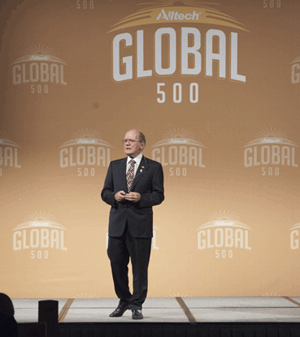Alltech's Global 500 Establishes the Next Steps for Dairy and Beef Industries

Alltech's Global 500 closed Thursday after welcoming dairy and beef producers from 40 countries to Alltech's home in Lexington, Ky. Dr. Pearse Lyons, president and founder of Alltech, closed Global 500 with seven take-home messages:
1. The gene chip. What genes are switched on and off by certain nutrients? What is causing obesity? The gene chip is pinpointing again and again what is happening at a genetic level.
2. Closing the gap There are two gaps that need to close. First, we must close the communication gap between ourselves and the consumer. Second, we must close the nutrition gap. Nutrition has not kept pace with genetics; the world is moving on and we need to catch up.
3. We have to start on the farm because it is there that we can make huge improvements. It is there that if we learn how to feed the plant that we can make a huge difference. One plant can give you a ton more grain per acre, a ton with higher starch and better protein, translating to more weight gain or more milk.
4. We need to remember that the rumen is a fermenter. As we fine-tune this fermenter, we can improve weight gain, lean meat and reduce pollution. The rumen must be fed all day, be it nitrogen or carbohydrate, and this is why Optigen® is such a success.
5. Fertility is crucial, and we shouldn't be culling our animals. DHA is important for animals, and it comes from algae.
6. We learned about the perfect steak. It's nothing artificial; it's simply about feeding the animal properly.
7. Branding is our way of getting our ideas out. Brand beef and milk to set it apart. We heard about the eight rules of branding, but nothing starts until you take the first step. Be relentless, be consistent, be the first.

dream, dare, desire, decide, and dedicate.
Instability in the dairy and beef industries did not manage to dampen the spirits of attendees at this year's Global 500. Instead, there was a consensus that something needed to be done. Speakers focused on what producers could do to regain control of their markets.
Jack Corless, global dairy consultant at Rumsol, advised that farmers "look at components that contribute - a hierarchy of needs: environment, management, agronomy, nutrition. We need to look at how we manage that animal, then look at fermentation, the rumen, the nutrition. Before we look at nutrition, we need to look at environment. Each of these animals has a maintenance cost no matter the cost of production."
Andrew Linscott, ruminant specialist with Alltech, focused on the hidden threat from mycotoxins and what can be done to identify them.
"Twenty-five percent of a cow's genetic potential is stolen by mycotoxins, but sometimes the problem is invisible," said Linscott. "On top of this, the process of making DDGs has been shown to potentially concentrate the mycotoxin threat by a factor of three. With the 37+ Program we can currently test for 38 different mycotoxins, and this number is still growing. There is no need for guesswork anymore."
Carbon footprint was also a hot topic at Global 500, with Kevin Tuck of Alltech discussing the opportunities that come with this new issue.
"The more productive the cow, the lower the emissions are. We need to increase milk yield or weight gain per cow, feed lower carbon ingredients so no soybean meal, manage dietary proteins and improve overall feed efficiency. Carbon foot printing is not an imposition but rather a fantastic opportunity to make us more efficient and increase our margins out of this system," said Tuck.
Robert Walker, European director for Alltech Crop Science, spoke about forage and making the most out of it with Grain-Set®.
"The treated plants have nice fibrous root systems and have more of the bigger anchoring roots to keep them full in the ground. That's what makes the difference. In the United States this year, we had a massive drought. In northern Europe, we had floods. When you have roots like this, you can protect your crops. Visible results are very significant," said Walker.
Farmers and producers from around the world shared their unique regional challenges and successes with each other, and all went away with something new to consider.
"This event brought forth many great ideas, such as the gene chip. I've never been to a conference before that makes me want to go home and do things differently," said Andy Hofer, a beef farmer who runs a 1,000 cow operation, conception to consumption, near Alberta, Canada.
For more information on Global 500 and more detailed information about the presentations, visit the Alltech blog and, for photos, visit Alltech's online photo gallery. Presentations can be viewed on demand through the AlltechAgNetwork.
12.07.2012